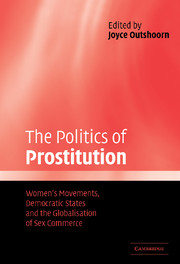 The Politics of Prostitution
The Politics of Prostitution Book contents
- Frontmatter
- Contents
- List of figures
- List of tables
- Notes on contributors
- Preface
- 1 Introduction: prostitution, women's movements and democratic politics
- 2 The women's movement and prostitution politics in Australia
- 3 Taxes, rights and regimentation: discourses on prostitution in Austria
- 4 Prostitution policies in Britain, 1982–2002
- 5 Prostitution as public nuisance: prostitution policy in Canada
- 6 Towards a new prohibitionism? State feminism, women's movements and prostitution policies in Finland
- 7 Prostitute movements face elite apathy and gender-biased universalism in France
- 8 The politics of prostitution and trafficking of women in Israel
- 9 Italy: the never-ending debate
- 10 Voluntary and forced prostitution: the ‘realistic approach’ of the Netherlands
- 11 State feminism and central state debates on prostitution in post-authoritarian Spain
- 12 Criminalising the john – a Swedish gender model?
- 13 The invisible issue: prostitution and trafficking of women and girls in the United States
- 14 Comparative prostitution politics and the case for state feminism
- Appendix 1 Independent variable indicators
- Appendix 2 Worksheets
- References
- Index
3 - Taxes, rights and regimentation: discourses on prostitution in Austria
Published online by Cambridge University Press: 22 September 2009
- Frontmatter
- Contents
- List of figures
- List of tables
- Notes on contributors
- Preface
- 1 Introduction: prostitution, women's movements and democratic politics
- 2 The women's movement and prostitution politics in Australia
- 3 Taxes, rights and regimentation: discourses on prostitution in Austria
- 4 Prostitution policies in Britain, 1982–2002
- 5 Prostitution as public nuisance: prostitution policy in Canada
- 6 Towards a new prohibitionism? State feminism, women's movements and prostitution policies in Finland
- 7 Prostitute movements face elite apathy and gender-biased universalism in France
- 8 The politics of prostitution and trafficking of women in Israel
- 9 Italy: the never-ending debate
- 10 Voluntary and forced prostitution: the ‘realistic approach’ of the Netherlands
- 11 State feminism and central state debates on prostitution in post-authoritarian Spain
- 12 Criminalising the john – a Swedish gender model?
- 13 The invisible issue: prostitution and trafficking of women and girls in the United States
- 14 Comparative prostitution politics and the case for state feminism
- Appendix 1 Independent variable indicators
- Appendix 2 Worksheets
- References
- Index
Summary
Introduction
Prostitution was an important part of Viennese culture during the fin de siècle. Both Felix Salden's famous novel Josefine Mutzenbacher and Karl Krauss's essays on ‘morality’ reflect the public presence of prostitution during the Habsburg Empire. In post-war Austria, prostitution did not become a public issue until the mid-1980s, although the city centre of Vienna remained a famous red light district. Prostitution was seen as ‘immoral’, dangerous and criminal, and was therefore taboo at the lofty heights of the policy-makers.
Today sex work in Austria is mostly performed by migrant women. In October 2000, 513 prostitutes were registered as working in Vienna, 20 per cent of whom were without Austrian citizenship. It is estimated that fewer than 10 per cent of all Viennese sex workers are registered, meaning that 5,000 to 7,000 prostitutes work in the city and that 85 per cent of them are migrant women, most of whom come from the former socialist countries (Stockinger 2001: 10).
Prostitution first appeared on the political agenda in the 1970s through the comprehensive reform of the authoritarian Penal Code (1975). The new Penal Code no longer considered prostitution criminal; only ‘illicit sexual acts in public’ (§218), soliciting (§219) and pimping to exploit (§216) were still included in the Penal Code. Since then prostitution policy has evolved ‘by chance’, as by-product of other policies, such as health or taxation policies. More often than not, it was the courts, not the legislature, that initiated the most important decisions regarding prostitution.
- Type
- Chapter
- Information
- The Politics of ProstitutionWomen's Movements, Democratic States and the Globalisation of Sex Commerce, pp. 41 - 61Publisher: Cambridge University PressPrint publication year: 2004
- 4
- Cited by


